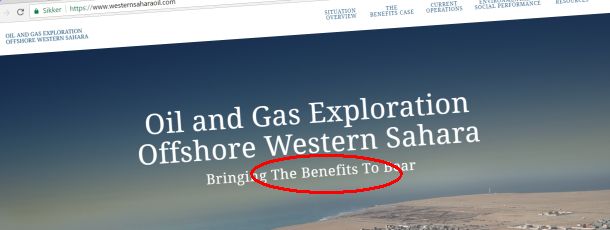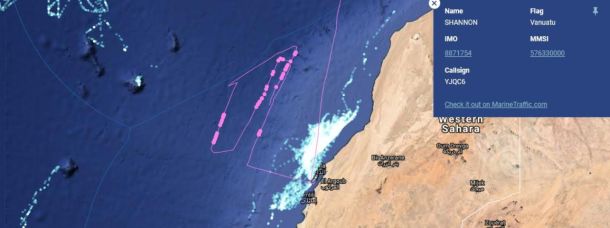Kosmos Energy violates the law, Sahrawi republic says

The US oil firm Kosmos Energy is contributing to the illegal occupation of Western Sahara, and violates both international law and Western Sahara law, according to the representatives of the people of the territory.
Published 23 March 2011
22 March 2011, the below letter was sent by Frente Polisario to the Chairman of Kosmos Energy, John R. Kemp. Letter can also be downloaded.
22 March 2011
John R. Kemp, III
Chairman of the Board of Directors
Kosmos Energy Ltd.
8176 Park Lane, Suite 500
Dallas TX 75231 USA
Dear Mr. Kemp:
RE: Kosmos Energy and Western Sahara
Further to my letters to Mr. James C. Musselman, former Chairman and Chief Executive Officer of Kosmos Energy LLC (‘Kosmos’) on 16 June 2006 and on 15 January 2009 regarding the activities of your company offshore of the territory of Western Sahara, I am writing again to raise some important issues with you.
The purpose of this letter, following the filing of a prospectus on January 14 with the U.S. Securities and Exchange Commission for the initial public offering of shares in Kosmos Energy Ltd. (“Kosmos Energy”) and the recent extension of exploration rights to your company in the so-called “Boujdour Block” of the continental shelf seaward of Western Sahara, is two-fold.
First, the Saharawi people request Kosmos Energy ceases all exploration activities on the continental shelf of Western Sahara including the Boujdour Block permit areas. Second, I respectfully request to be provided with exploration data obtained by your company to date from the Boujdour Block areas.
Although I anticipate you are acquainted with the history of Western Sahara and the particular issue of the Saharawi people’s right of permanent sovereignty to the natural resources of the territory, some background is useful. Western Sahara, formerly Spanish Sahara, has been described as Africa’s last colony. The territory was abandoned by Spain in November 1975, ceded illegally to Mauritania and Morocco who occupied a large part of it progressively over the following years. The occupation, it should be noted, was by armed force contrary to international law and international humanitarian law and a considerable number of United Nations resolutions. On February 27, 1976, the representatives of the Saharawi people declared the independence of the Saharawi Arab Democratic Republic (the “SADR”), a state recognized by more than 80 countries and virtually all member states of the African Union. In 1979, the SADR and Mauritania concluded a peace treaty on Mauritania’s admission it had illegally occupied the territory, so resulting in its entire
withdrawal. The Kingdom of Morocco subsequently occupied a larger part of Western Sahara, now two-thirds of the territory.
It is important to note that Morocco’s occupation of Western Sahara is illegal under the
United Nations Charter, the law of self-determination for colonized (non-self-governing) peoples and international criminal law. The recent and similar cases of East Timor, Namibia (South West Africa) and Kuwait underscore such illegality.
Morocco’s occupation of Western Sahara is notoriously brutal, failing to comply with even basic norms of the Fourth Geneva Convention and the International Covenant on Civil and Political Rights, treaties of universal application that Morocco (and the United States) acceded to many decades ago. It should be added the human rights situation inside occupied Western Sahara is deteriorating. We must also recall those tens of thousands of Saharawis displaced as refugees inside Algeria for 35 years. And there is the profound illegality of the sand wall constructed to divide Western Sahara; a 2,000 kilometre long structure garrisoned by some 120,000 Moroccan soldiers and ringed with an estimate five million landmines, all contrary to accepted norms of international law.
This illegal occupation of Western Sahara is legitimized, in part, by individuals and corporations who would deal with Morocco for the natural resources of the territory. The conflict over Western Sahara is prolonged, and the Saharawi people denied their economic future, by such engagement. The present controversy over European fishing in Saharan waters demonstrates this.
Quite apart from the fact of the continuing illegal occupation of Western Sahara, Morocco has no right or title to the continental shelf in which the Boujdour Blocks are found, for Morocco has not enacted ocean jurisdiction legislation over the Saharan coast nor made public its claimed areas, a requirement of the 1982 United Nations Convention on the Law of the Sea. It is the SADR alone that claims an exclusive economic zone off the Saharan coast. Kosmos Energy’s continuing exploration for seabed petroleum in the Boujdour Blocks area contravenes the SADR’s maritime jurisdiction legislation, particularly Article 8(3) Law No. 03/2009 of 21 January 2009 Establishing the Maritime Zones of the Saharawi Arab Democratic Republic: http://www.sadroilandgas.com/pdfs/09_04_28_eez_law.pdf
There is an important point to add. It is that the Saharawi people have neither consented to nor realize any benefit from the exploration and use of the natural resources of their territory. While the government of the SADR welcomes commercial development, it must be achieved within a framework of legality as a matter of international and domestic law.
I welcome your response in this matter. It is an affair of great consequence for the Saharawi people, directly in respect of our natural resources and your company’s presence in Western Sahara, and indirectly because of its perpetuation of an illegal occupation.
Yours sincerely,
Emhamed Khadad,
Member of the Polisario leadership and
Advisor to the SADR President.
cc: Brian F. Maxted, Chief Executive Officer Kosmos Energy Ltd.
News
Kosmos Energy maintains propaganda site after Western Sahara exit
Kosmos Energy has decided to keep their website defending Western Sahara oil search - even after they have left the territory.
06 March 2018
Studies continue on Kosmos Energy's block
Is Kosmos Energy undertaking a last survey on the Boujdour Maritime licence before it waves goodbye to occupied Western Sahara? Or has an unknown company taken over the licence? Last week, seabed petroleum surveys started at the place where Kosmos drilled in 2014.
08 February 2018
Kosmos and Cairn have pulled out of Western Sahara
17 years of US private company engagement in exploring the oil potential of Western Sahara has come to an end.
07 February 2018
Kosmos surveying oil potential near Dakhla again?
Over the past 24 hours, WSRW has observed a resumed seabed exploration north of Dakhla, in the block operated by American oil company Kosmos Energy in collaboration with Scotland's Cairn Energy.
26 October 2017



